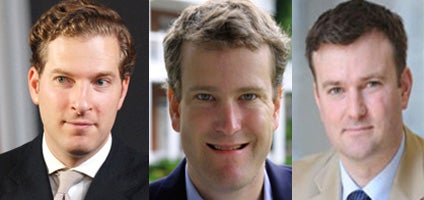HLS Professor Noah Feldman and a team of HLS affiliates have authored a report at the request of the Commission on Truth and Reconciliation of Honduras (TRC), examining the constitutionality of the actions in Honduras that resulted in the 2009 military coup that removed President Manuel Zelaya from office. In the report, the authors offer recommendations for constitutional reform for the Central American country.
The report’s co-authors include: David Landau ’04, assistant professor at Florida State University College of Law and Brian Sheppard, HLS S.J.D. candidate and associate professor at Seton Hall University School of Law. Leonidas Rosa Suazo, attorney at Bufete Rosa y Asociados in Honduras, served as the local consultant for the project.
The report found that both parties – Zelaya and those who removed him from office – likely acted unconstitutionally on numerous occasions. The authors suggest a series of reforms aimed at fighting the threat of unconstitutional presidential action and the threat of military intervention.
“The Honduran case raised two serious threats to democracy, military intervention in politics and presidential actions aimed at eroding democracy from within, that have long plagued newer democracies within Latin America and around the world,” Landau said. “Our suggested reforms aim to strengthen Honduran institutions against both threats. For example, it is imperative that the judiciary be made more independent and more capable so that crises are resolved by the judiciary instead of the military.”
Feldman added: “This is a great example of a project born here at HLS that spreads through the world. David and Brian and I met here when they were fellows; and all of our different expertise was needed for the project, which involved fieldwork and theory and hard legal analysis. We hope our findings will be helpful for the TRC looking backward, but also for the future.”
On June 1, the Organization of American States (of which the United States is a member) voted to readmit Honduras to the organization, following the Honduran government’s agreement to allow Zelaya to return from exile without threat of imprisonment or prosecution. The Honduran government has also signaled its willingness to consider constitutional reforms, including those recommended to the Commission on Truth and Reconciliation of Honduras by Feldman, Landau and their co-authors.
The OAS suspended Honduras from membership in 2009, finding that the ouster of Zelaya constituted an interruption of democracy under Article 21 of the Inter-American Democratic Charter.
“The OAS vote, along with a recent agreement between Zelaya and the current Honduran president that paved the way for Zelaya’s return to the country, are important events that have started the reconciliation process. But they are not the end of the process,” Landau said. “The formal presentation of the findings of the TRC in mid-June will be a key event, and we expect a long process of constitutional and legal reforms in the coming years. The end result will be a more vibrant and stable democracy in Honduras.”
The report will be publicly available in English and Spanish after the Commission for Truth and Reconciliation has formally presented its own report sometime this summer. The announcement of the OAS vote is available here.
Feldman, Landau and Sheppard further discussed Honduras’s legal prospects in a June 7 op-ed in the Los Angeles Times.
